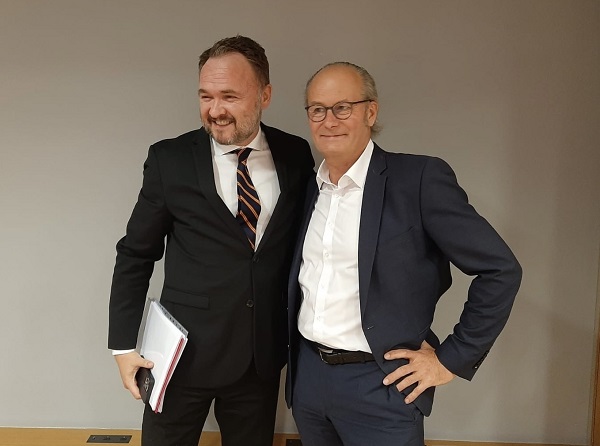 L-R: Dan Jørgensen, Denmark's Minister for Climate, Energy and Utilities; Claude Turmes, Luxembourg's Minister of Energy;
Credit: MEA
L-R: Dan Jørgensen, Denmark's Minister for Climate, Energy and Utilities; Claude Turmes, Luxembourg's Minister of Energy;
Credit: MEA
Luxembourg and Denmark have concluded a cooperation agreement to accelerate the energy transition.
At its meeting on Wednesday 7 December 2022, Luxembourg's Government Council (cabinet) approved a draft bill ratifying the treaty between the Grand Duchy of Luxembourg and the Kingdom of Denmark on the statistical transfers of energy produced from renewable sources in order to respect the objectives set out in Directive (EU) 2018/2001 of the European Parliament and of the Council of 11 December 2018 on the promotion of the use of energy from renewable sources.
Through this cumulative agreement ranging from €33.12 to €66.24 million (depending on the annual needs in Luxembourg for renewable energy statistics) from 2021 to 2025, the sums transferred to Denmark will be invested in new projects in the field of renewable energies, for example the financing of the energy islands planned in the North Sea, as well as other renewable energy projects such as the development of wind turbines at sea or green hydrogen.
This agreement follows the signing between Luxembourg's Minister of Energy, Claude Turmes, and Denmark's Minister for Climate, Energy and Utilities, Dan Jørgensen, on 10 June 2021 of a memorandum of understanding (MoU) concerning cooperation in the field of renewable energies. Since then, regular discussions have taken place in order to be able to concretise the collaboration envisaged between the two countries.
The European Renewable Energy Directive (RED) allows Member States of the European Union (EU) to enter into statistical transfer agreements, a mechanism that allows certain volumes of renewable energy to be transferred from one country to another for the purposes of national renewable energy targets. The mechanism does not provide for the physical transfer of energy, only the transfer of statistical data.
The green energy produced in Denmark – a country with a high renewable energy potential, which has enabled it to exceed its national target – will therefore be counted in Luxembourg – a country which, by virtue of its surface area and the fact that it is a landlocked country, has limited potential to develop renewable energies on its soil.
Energy Minister Turmes stated: "I am happy that Luxembourg, as a landlocked country, can contribute financially to accelerating the development of renewable energies in the North Sea. This cooperation with Denmark is intended to complement the national strategy which aims to carry out renewable energy projects on national territory".








